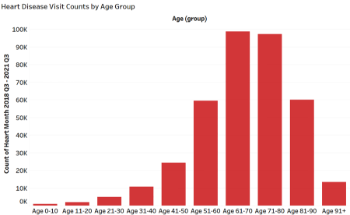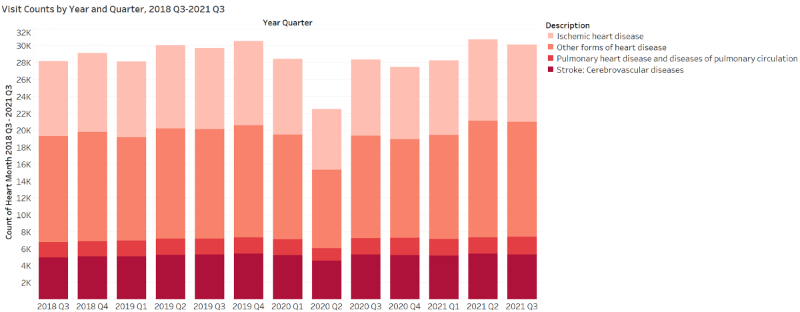Vol. 66, Issue 5
View more issues of The Valued Voice
Sign Up for WHA's Newsletter
Click here to view past issues
IN THIS ISSUE
- Enrollment in Health Insurance Exchange Marketplace on the Rise for 2022
- WHA Council on Workforce Development Recommits to Addressing Workforce Challenges in 2022
- Health Care Advocates Share Perspectives on Industry Trends at Mega Healthcare Conference
- Fast Facts from the WHA Information Center: February is American Heart Month
- WADVS Announces the Installation of Five New Officers and Appointment of One New Regional Representative
EDUCATION EVENTS
Jan. 6, 2026
Age-Friendly Webinar Series Featuring Advocate HealthJan. 14, 2026
Caring for Wisconsin’s Caregivers Well-Being First Champion Challenge for Credentialing KickoffJan. 28, 2026
2026 WHA Health Care Leadership AcademyClick here to view education event calendar
View more issues of The Valued Voice
Sign Up for WHA's Newsletter
Thursday, February 3, 2022
 Every February is recognized as American Heart Month to call attention to and educate people on the impacts of heart conditions. According to the National Institutes of Health, heart disease is the number-one leading cause of death in the United States for both men and women. The Centers for Disease Control and Prevention also notes that heart disease is the leading cause of death for most ethnic and racial groups. Nearly 650,000 Americans die from heart disease each year—meaning every one in three deaths is due to a heart disease. Coronary heart disease is the most common type of heart disease, impacting about 18.2 million adults over the age of 20.
Every February is recognized as American Heart Month to call attention to and educate people on the impacts of heart conditions. According to the National Institutes of Health, heart disease is the number-one leading cause of death in the United States for both men and women. The Centers for Disease Control and Prevention also notes that heart disease is the leading cause of death for most ethnic and racial groups. Nearly 650,000 Americans die from heart disease each year—meaning every one in three deaths is due to a heart disease. Coronary heart disease is the most common type of heart disease, impacting about 18.2 million adults over the age of 20.
 The WHA Information Center (WHAIC) analyzed data from September 2018 to September 2021 to see how Wisconsin hospitals and patients are impacted by heart disease. Visit counts per quarter were fairly consistent throughout the year, except for April through June of 2020, during the COVID-19 shutdown.
The WHA Information Center (WHAIC) analyzed data from September 2018 to September 2021 to see how Wisconsin hospitals and patients are impacted by heart disease. Visit counts per quarter were fairly consistent throughout the year, except for April through June of 2020, during the COVID-19 shutdown.
 Ischemic heart disease accounts for the most visit counts when looking at heart disease conditions. Men accounted for 58% of all visit counts related to heart disease. The national average age for a heart attack is 64 for men and 70 for women. WHAIC data shows that for the average age is 66 men and 69 for women. Accordingly, the age group with the largest visit count during this period was 61-70.
Ischemic heart disease accounts for the most visit counts when looking at heart disease conditions. Men accounted for 58% of all visit counts related to heart disease. The national average age for a heart attack is 64 for men and 70 for women. WHAIC data shows that for the average age is 66 men and 69 for women. Accordingly, the age group with the largest visit count during this period was 61-70.
National Today provides the following facts about heart health:

Fast Facts from the WHA Information Center: February is American Heart Month
 Every February is recognized as American Heart Month to call attention to and educate people on the impacts of heart conditions. According to the National Institutes of Health, heart disease is the number-one leading cause of death in the United States for both men and women. The Centers for Disease Control and Prevention also notes that heart disease is the leading cause of death for most ethnic and racial groups. Nearly 650,000 Americans die from heart disease each year—meaning every one in three deaths is due to a heart disease. Coronary heart disease is the most common type of heart disease, impacting about 18.2 million adults over the age of 20.
Every February is recognized as American Heart Month to call attention to and educate people on the impacts of heart conditions. According to the National Institutes of Health, heart disease is the number-one leading cause of death in the United States for both men and women. The Centers for Disease Control and Prevention also notes that heart disease is the leading cause of death for most ethnic and racial groups. Nearly 650,000 Americans die from heart disease each year—meaning every one in three deaths is due to a heart disease. Coronary heart disease is the most common type of heart disease, impacting about 18.2 million adults over the age of 20. The WHA Information Center (WHAIC) analyzed data from September 2018 to September 2021 to see how Wisconsin hospitals and patients are impacted by heart disease. Visit counts per quarter were fairly consistent throughout the year, except for April through June of 2020, during the COVID-19 shutdown.
The WHA Information Center (WHAIC) analyzed data from September 2018 to September 2021 to see how Wisconsin hospitals and patients are impacted by heart disease. Visit counts per quarter were fairly consistent throughout the year, except for April through June of 2020, during the COVID-19 shutdown. Ischemic heart disease accounts for the most visit counts when looking at heart disease conditions. Men accounted for 58% of all visit counts related to heart disease. The national average age for a heart attack is 64 for men and 70 for women. WHAIC data shows that for the average age is 66 men and 69 for women. Accordingly, the age group with the largest visit count during this period was 61-70.
Ischemic heart disease accounts for the most visit counts when looking at heart disease conditions. Men accounted for 58% of all visit counts related to heart disease. The national average age for a heart attack is 64 for men and 70 for women. WHAIC data shows that for the average age is 66 men and 69 for women. Accordingly, the age group with the largest visit count during this period was 61-70.National Today provides the following facts about heart health:
- Heart attacks can be silent. One in five heart attacks occurs without the person even knowing they had one.
- Heart attacks affect women differently. Women may experience different symptoms than men. They include pain in the back, arm, neck, or shoulder; nausea; fatigue; shortness of breath; vomiting.
- Young women are at a higher risk than men. Women under the age of 50 are twice as likely to die of a heart attack as men in the same age group.
- Another reason to hate Mondays. Heart attacks are more likely to occur on Monday mornings than other days of the week. Scientist’s attribute this to the disruption in our circadian rhythm over the weekend which leads to increased blood pressure and other changes to the nervous system.
- Diet soda raises heart attack risk. If you drink one or more diet sodas a day, your chances of having a heart attack are 43% higher than those who drink regular soda or none at all.

Vol. 66, Issue 5
Thursday, February 3, 2022
Fast Facts from the WHA Information Center: February is American Heart Month
 Every February is recognized as American Heart Month to call attention to and educate people on the impacts of heart conditions. According to the National Institutes of Health, heart disease is the number-one leading cause of death in the United States for both men and women. The Centers for Disease Control and Prevention also notes that heart disease is the leading cause of death for most ethnic and racial groups. Nearly 650,000 Americans die from heart disease each year—meaning every one in three deaths is due to a heart disease. Coronary heart disease is the most common type of heart disease, impacting about 18.2 million adults over the age of 20.
Every February is recognized as American Heart Month to call attention to and educate people on the impacts of heart conditions. According to the National Institutes of Health, heart disease is the number-one leading cause of death in the United States for both men and women. The Centers for Disease Control and Prevention also notes that heart disease is the leading cause of death for most ethnic and racial groups. Nearly 650,000 Americans die from heart disease each year—meaning every one in three deaths is due to a heart disease. Coronary heart disease is the most common type of heart disease, impacting about 18.2 million adults over the age of 20. The WHA Information Center (WHAIC) analyzed data from September 2018 to September 2021 to see how Wisconsin hospitals and patients are impacted by heart disease. Visit counts per quarter were fairly consistent throughout the year, except for April through June of 2020, during the COVID-19 shutdown.
The WHA Information Center (WHAIC) analyzed data from September 2018 to September 2021 to see how Wisconsin hospitals and patients are impacted by heart disease. Visit counts per quarter were fairly consistent throughout the year, except for April through June of 2020, during the COVID-19 shutdown. Ischemic heart disease accounts for the most visit counts when looking at heart disease conditions. Men accounted for 58% of all visit counts related to heart disease. The national average age for a heart attack is 64 for men and 70 for women. WHAIC data shows that for the average age is 66 men and 69 for women. Accordingly, the age group with the largest visit count during this period was 61-70.
Ischemic heart disease accounts for the most visit counts when looking at heart disease conditions. Men accounted for 58% of all visit counts related to heart disease. The national average age for a heart attack is 64 for men and 70 for women. WHAIC data shows that for the average age is 66 men and 69 for women. Accordingly, the age group with the largest visit count during this period was 61-70.National Today provides the following facts about heart health:
- Heart attacks can be silent. One in five heart attacks occurs without the person even knowing they had one.
- Heart attacks affect women differently. Women may experience different symptoms than men. They include pain in the back, arm, neck, or shoulder; nausea; fatigue; shortness of breath; vomiting.
- Young women are at a higher risk than men. Women under the age of 50 are twice as likely to die of a heart attack as men in the same age group.
- Another reason to hate Mondays. Heart attacks are more likely to occur on Monday mornings than other days of the week. Scientist’s attribute this to the disruption in our circadian rhythm over the weekend which leads to increased blood pressure and other changes to the nervous system.
- Diet soda raises heart attack risk. If you drink one or more diet sodas a day, your chances of having a heart attack are 43% higher than those who drink regular soda or none at all.

IN THIS ISSUE
- Enrollment in Health Insurance Exchange Marketplace on the Rise for 2022
- WHA Council on Workforce Development Recommits to Addressing Workforce Challenges in 2022
- Health Care Advocates Share Perspectives on Industry Trends at Mega Healthcare Conference
- Fast Facts from the WHA Information Center: February is American Heart Month
- WADVS Announces the Installation of Five New Officers and Appointment of One New Regional Representative

